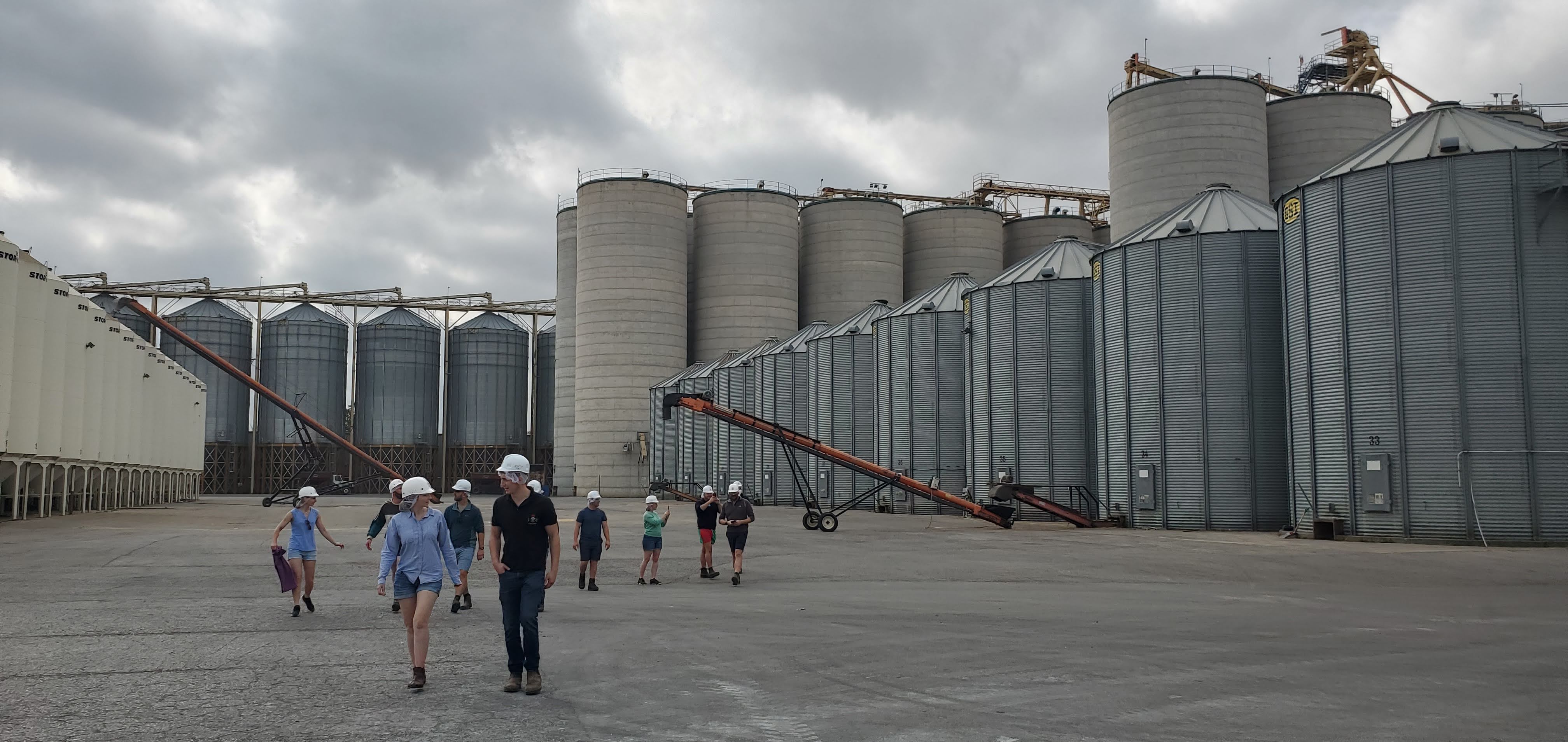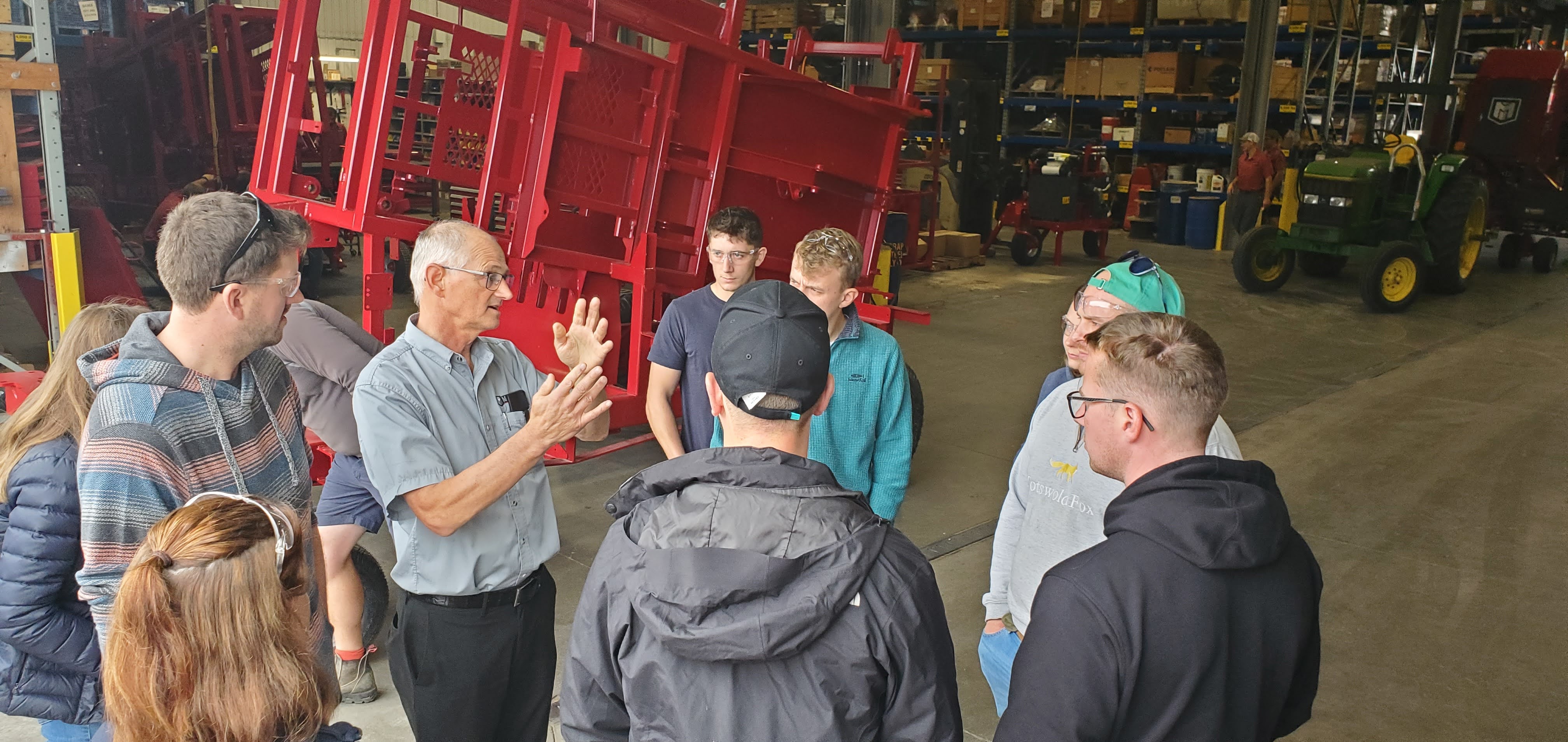By Mel Luymes (the exhausted tour guide!)
In early October, a group of 12 young Welsh farmers took southwestern Ontario by storm. They were with the Farming Connect Agri-Academy, a government-funded leadership program aimed at developing the skills of aspiring leaders in the Welsh agricultural industry. The program offers mentoring, networking, and a series of study visits, including a one-week trip abroad to help them drive innovation and adopt best practices for their farms. In the past, they have visited New Zealand, Iceland, and the Netherlands but for the past two years, they chose to explore the diversity of agriculture we have in southwestern Ontario.
It began with a connection that an Agri-Academy staff member made with me via social media in early 2023, and I hosted a group that October. We had such a good time that I visited Wales in late November after I attended the AgriTechnica convention in Germany. While it is part of the United Kingdom, it is quite different from England and retains its own language. It has narrow winding roads, old buildings, plenty of pubs, gorgeous green hills, dotted with sheep, cattle and the odd castle. The people are warm and friendly with a tremendous sense of humour.
So, when they asked me to host another group this year, I didn’t hesitate. They came from different types of livestock farms across Wales and were between the ages of 25 and 35. From the time they arrived in Guelph on September 29 in three rented trucks, it was a whirlwind tour that had them on the road every day and in each direction.

On Monday they went to visit Sandi Brock, a sheep farmer and social media influencer (Sheepishly Me) near Staffa. As many of the Agri-Academy participants raised sheep, they had a million questions for her, and it was difficult to pry them away from Sandi to get to Hensall Co-op just down the road. Chris Van Loo brought them around the facilities that process much of the baked beans they eat in the U.K. and they were impressed with the size of trucks, the amount of storage, and the technology of the cleaning and processing facilities. They got back on the road to tour the Elora Dairy Research Centre to learn more about the research being done there and they spoke with Christoph Wand, OMAFA’s Livestock Sustainability Specialist. They discussed subsidies, environmental programs, risk management and Canada’s quota system, which is similar to the dairy quotas that were withdrawn in the EU in 2015. The group also caught the last harness race at the Grand River Raceway before heading back to Guelph.
On Tuesday, the group started the morning at Elmira’s Bio-En Power plant, which powers the town on food waste through an anaerobic digester. They learned about its plans for expansion into renewable natural gas in Ontario, with all the provincial politics involved. Next, on the other side of Listowel, owner Mark Horst toured the group around Marcrest Manufacturing Inc., where the Bale Baron is assembled. As Marcrest is exporting around the world, many of the Welsh farmers had seen the equipment in the UK. They went through the ins and outs of making great hay, and Horst brought them to his hay dryers and storage, which boasted dry hay as green as the day it was cut.

After a fabulous lunch at Your Neighbourhood Table, they tried their first butter tarts. Then it was off to see a nearby drainage installation by Dryden Drainage and a quick stop at Luymes Farms to see some equipment before heading to a field to see some silage chopping in action. The group ended the day with Janet Harrop and the University of Guelph’s Sean Jordan at Harrcroft Acres near Fergus, to see the carbon and greenhouse gas research being done through the federal Living Labs project.
Wednesday took the group further north, with a stop at Springhills Fish near Hanover and a fascinating tour with Arlen Taylor of the whole process from spawning eggs to water cleaning, and processing for the customer. Only a quick drive down the road, they met up with Ty Hunt, manager of one of the Schaus feedlots. Just as with Sandi Brock’s Britespan barn, they were impressed with the natural light and airflow of We Cover Structures. They stopped for wood-fired pizzas before taking a quiet moment at Well 5 to learn about the Walkerton Tragedy and the subsequent agri-environmental and management regulations that now protect public health.
Next, they got a bus tour of Bruce Power, along with a good look at Lake Huron. They stopped for a presentation at the Nuclear Waste Management Organization’s Learn More Centre in Teeswater on their way back, met up with Adam Ireland combining the last of his soybeans and also met Brett Israel of 3Gen Organics at Conestoga Lake. Israel talked about raising pigs, diversification and direct marketing, organic standards, multi-generational farms and succession.
After a night learning line dancing with University of Guelph’s agricultural students at Aggie Pub, the group of Welsh farmers had an early morning drive across the city to the International Plowing Match in Lindsay, where they got to catch a rodeo. Just down the road, they paid a visit to Woodleigh Farms and met Norm Lamothe, discussed biochar, cover crops and drones, maple syrup, making compost and regenerative farming. They loved how Lamothe strip-grazed his sheep and kept a fluffy Great Pyrenees-Maremma guard dog there to protect them. To a Welsh farmer, sheepdogs are agile herding dogs, and their sheep don’t need much protection on pasture. On the way back, the group got to see the sun set across the Holland Marsh and stopped in Bradford for some authentic Mexican food.
Friday was their last day in Canada, and they had yet to see Niagara Falls. On the way, Joe Stutzman toured them around First Line Training Centre; they got to see a horse doing its cardio in the pool and learned more about the equine industry in Ontario. The Falls didn’t disappoint, and they stopped at Niagara-on-the-Lake on their way back to the airport to tour Spirit in Niagara distillery. To reduce the amount of food waste from the tender fruit industry, Arnie Lepp now creates gins, whiskeys, vodkas and more from the seconds of peaches, cherries, plums, etc. that would otherwise be wasted. Needless to say, the group slept soundly on the plane back to London.
For me, it was interesting to see Ontario agriculture through their eyes. They were amazed at how clean and well kept most of the farms are. They were suprised that we don’t have pick-up hitches in Ontario, and pointed out the lack of eavestroughs to divert clean water and other storages that wouldn’t have passed inspections in the U.K. There seemed to be much more regulation in the U.K. For example, the farmer who led the group had three chicken barns and wouldn’t get a permit to construct a barn without also purchasing an ammonia scrubber that pulls air from the barn through sulfur to form a nitrogen fertilizer.
The group also joked that Ontarians should have more vegetables and at our restaurants and that four-way stops should be turned into roundabouts. Overall, it was a great week, and I learned a lot from the tours as well. It made me quite proud of the agricultural innovation in our little corner of the world! ◊


